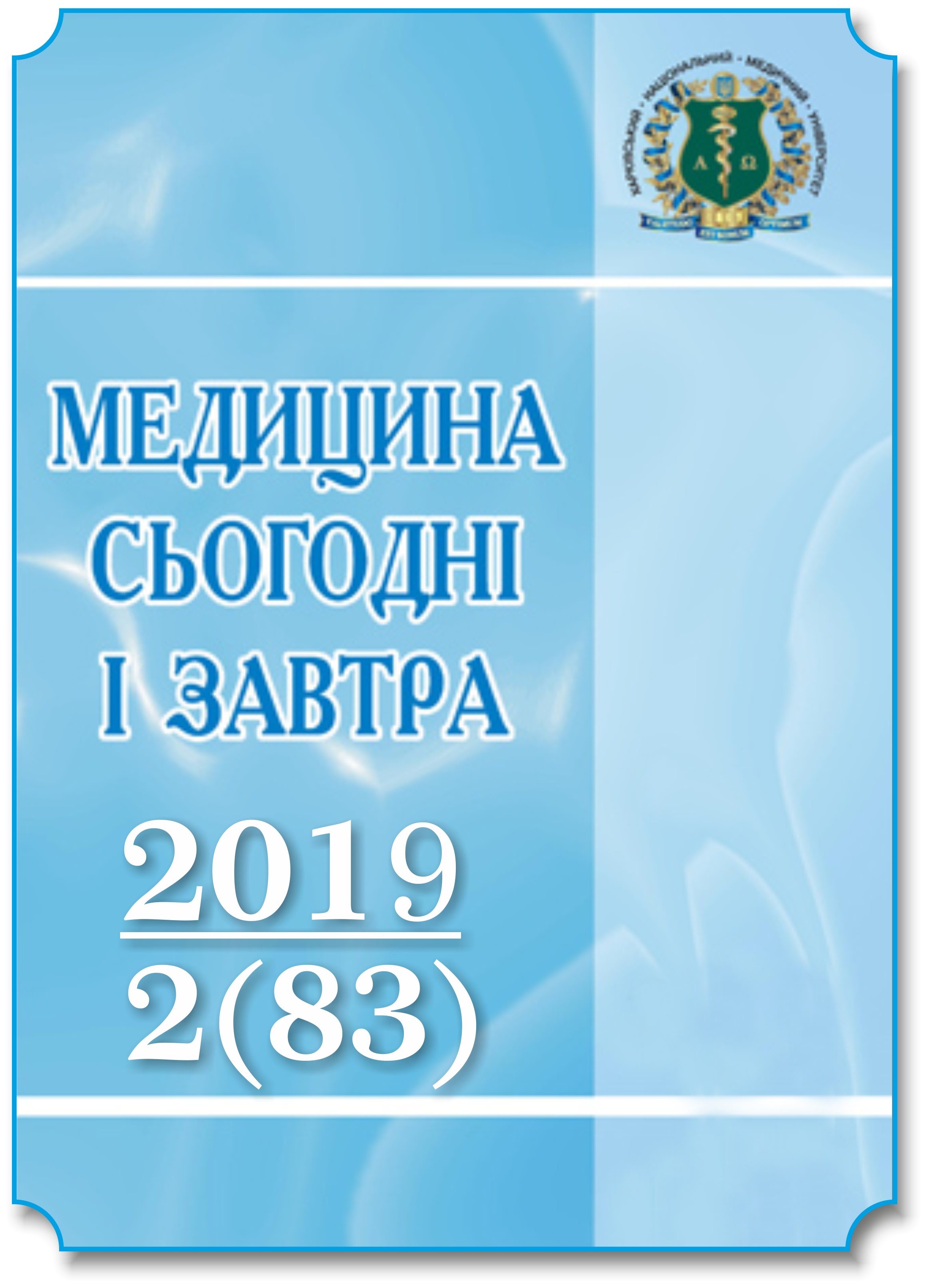Abstract
The behavioral component in treatment plays an important role influencing the effectiveness of therapy and recovery. At Kharkiv Regional Clinical Hospital – Emergency and Emergency Medicine Center during 2016–2018, observed 383 patients with cerebrovascular pathology on different stage of diseases and 47 healthy persons. In research we used Boston Stress Test, Ways of Coping Questionnaire, questionnaire «Level of compliance» and questionnaire «Type of psychological reaction on the disease». It was shown that the measures of medical and psychological assistance to patients with cerebrovascular pathology depend on the stage of the disease and the level of stress risk. The main task of psychological assistance to patients with cardiovascular risk is life style modification with the formation of health-centered skills, to patients with clinical manifestations is increased adherence to treatment and to correct maladaptive behavioral patterns, to patients after a stroke is activation and search for psychological resources to overcome the consequences of the disease. Development system of psychological help for patients with cerebrovascular pathology is an important part of the complex medical help to patients of this contingent.
References
Feigin V.L., Forouzanfar М.Н., Krishnamurthi R., Mensah G.A., Connor M., Bennett D.A. et al. (2014). Global and regional burden of stroke during 1990–2010: findings from the Global Burden of Disease Study 2010. Lancet, vol. 383, № 9913, pp. 245–254.
Babak O.Ya., Drozdova V.I., Babets A.A., Stepanova L.H., Omelnytska L.V. (2017). Khvoroby systemy krovoobihu v Ukraini yak odna z kharakterystyk suspilnoho zdorovia [Diseases of the blood circulation system in Ukraine as one of the characteristics of public health]. Ukrainskyi terapevtychnyi zhurnal – Ukrainian Therapeutical Journal, № 1, pp. 4–11 [in Ukrainian].
Markova M.V., Babych V.V. (2008). Medyko-psykholohichni aspekty rozvytku ta perebihu khvorob systemy krovoobihu [Medico-psychological aspects of development and recovery of the blood circulation system]. Novosti meditsiny i farmatsii – News of Medicine and Pharmacy, № 243 Nevrolohiia i psikhiatriia. Tematicheskii vypusk, pp. 71–74 [in Ukrainian].
Ilardi D., Ono K.E., McCartney R., Book W., Stringer A.Y. (2017). Neurocognitive functioning in adults with congenital heart disease. Congenit. Heart Dis., vol. 12 (2), pp. 66–173.
Fadieienko H.D., Hridnev O.Ye., Nesen A.O., Chernyshov V.A., Hrunchenko M.M., Shkapo V.L. (2013). Komorbidnist i vysokyi kardiovaskuliarnyi ryzyk – kliuchovi pytannia suchasnoi medytsyny [Comorbidity and high cardiovascular risk are crucial issues in modern medicine]. Ukrainskyi terapevtychnyi zhurnal – Ukrainian Therapeutical Journal, № 1, pp. 102–107 [in Ukrainian].
Shefer G., Silarova B., Usher-Smith J., Griffin S. (2016). The response to receiving phenotypic and genetic coronary heart disease risk scores and lifestyle advice – a qualitative study. BMC Public Health, vol. 16 (1), pp. 1221.
Du L., Cheng Z., Zhang Y., Li Y., Mei D. (2017). The impact of medication adherence on clinical outcomes of coronary artery disease: A meta-analysis. Eur. J. Prev. Cardiol., vol. 24 (9), pp. 962–970.
Astin F., Horrocks J., Closs S.J. (2014). Managing lifestyle change to reduce coronary risk: a synthesis of qualitative research on peoples’ experiences. BMC Cardiovasc. Disord., vol. 14, pp. 96.
Nissen N.K., Jónsdóttir M., Spindler H., Zwisler A.O. (2018). Resistance to change: Role of relationship and communal coping for coronary heart disease patients and their partners in making lifestyle changes. Scand. J. Public Health, vol. 46 (6), pp. 659–666.
Lawrence M., Booth J., Mercer S., Crawford E. (2013). A systematic review of the benefits of mindfulness-based interventions following transient ischemic attack and stroke. Int. J. Stroke, vol. 8 (6), pp. 465–474.
Mavaddat N., Ross S., Dobbin A., Williams K., Graffy J., Mant J. (2017). Training in positivity for stroke? A qualitative study of acceptability of use of Positive Mental Training (PosMT) as a tool to assist stroke survivors with post-stroke psychological problems and in coping with rehabilitation. NeuroRehabilitation, vol. 40 (2), pp. 259–270.
Lund A., Melhus M., Sveen U. (2018). Enjoyable company in sharing stroke experiences; lifestyle groups after stroke. Scand. J. Occup. Ther., vol. 25, issue 2, pp. 127–135.
Kongkasuwan R., Voraakhom K., Pisolayabutra P., Maneechai P., Boonin J., Kuptniratsaikul V. (2016). Creative art therapy to enhance rehabilitation for stroke patients: a randomized controlled trial. Clin. Rehabil., vol. 30, issue 10, pp. 1016–1023.

